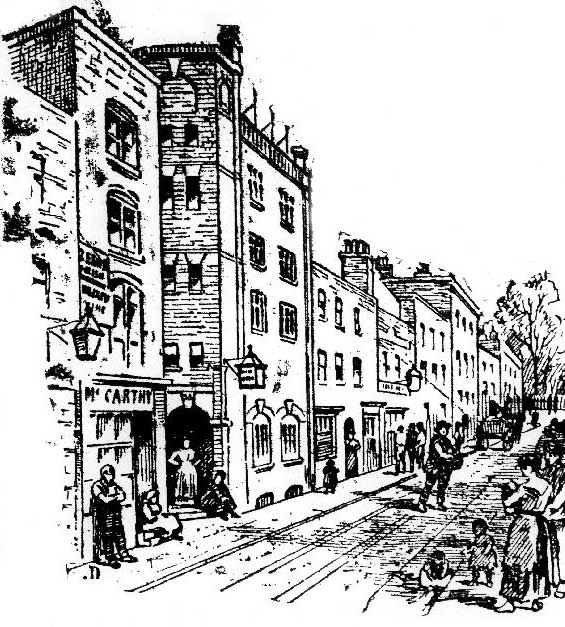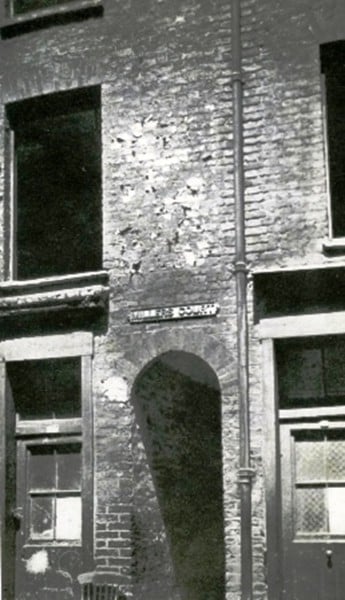As I have mentioned many times in previous blogs, Dorset Street, in Spitalfields, had a dreadful reputation for vice and villainy in the 19th century.
It was regarded by many as being one of the worst streets of London, and numerous crimes, not to mention several murders, took place in the street, and in the courts that led off it, not to mention in the common lodging houses that lined it.

WHERE MARY KELLY WAS MURDERED
Of course, today Dorset Street is largely recognised as being the location of the final Jack the Ripper murder, that of Mary Kelly on the 9th of November 1888.
Her murder took place in her room in Miller’s Court, one of the aforementioned courts that were located off Dorset Street in the 19th century.
Intriguingly, other crimes took place in Miller’s Court, including several other murders – such as that of Elizabeth Roberts, in 1898, and that of Kitty Ronan, in 1909.
However, in 1863, Miller’s Court was at the centre of a court case that took place at Worship Police Court and which was reported by the Evening Standard in its edition of Monday the 7th of September 1863:-
SINGULAR CASE OF ROBBERY AND FLIGHT
“Joseph Simon, a Polish Jew, 30 years of age, was charged before Mr. Leigh with complicity in stealing money and property amounting to above 100 shillings.
A ROBBERY IN HOXTON
Gould, an active plain clothes constable attached to the N division, said:-
“Last Tuesday evening I received information that a portmanteau, containing two gold watches, two silver watches, three 5s. Bank of England notes, together with other monies and a selection of wearing apparel, had been taken under false representation from a house, No. 24, Hoxton-square, and on making inquiry there ascertained that two men, about an hour previously, had called there, and took the property away under the representation that the owner, who was a lodger, had sent them for it, he having been unexpectedly called into the country, and would be unable to return for some days, a statement that appeared credible from the fact of the men producing a bunch of keys, one of which unlocked the portmanteau.
THE LAWFUL OWNER RETURNED
At a later hour, however, the deception that had been practised became known, as the lawful owner returned home, apparently the worse for something he had taken, and disavowed any share in, or giving the slightest authority for, the removal of the property.
TO MILLER’S COURT, DORSET STREET
I gained such information and description of the men as satisfied me that the prisoner was one of them, and taking the best opportunity went last night to a house in Miller’s-court, Dorset-street, Spitaltields, a very notorious neighbourhood.
On its becoming known that I was in search of him, a number of men interfered, and only with great difficulty did I escape a very rough handling.
On mentioning the charge, he directly admitted having had a share in the robbery, asserting that on the day in question one Solomon Kerfman, a Prussian, and owner of the portmanteau, called upon him, that one Lazarus was there also, and that they had some liquor together.

HE FELL ASLEEP
That Kerfman, from some cause or other, suddenly fell asleep, and that his keys were then taken from his pocket; after which he (the prisoner) and Lazarus went to Kerfman’s lodgings, in Hoxton-square, and obtained the trunk, which was placed in a cab, and so taken away to Shoreditch, at which point he (the prisoner), left the vehicle and property in the care of Lazarus, who at a late hour again joined him at his house Miller’s-court, and slept there, but decamped with the package early on the following morning, since which time be had not teen him or the property.”
LAZARUS IN FRANCE
The officer added, that upon this statement he took Simon into custody, and now requested a remand for the purpose of apprehending Lazarus, who as was believed, had made the best of his way to France.
Mr. Leigh inquired where Kerfman was, and Gould replied that, without making him acquainted with the intention, he had gone to France also after Lazarus,
The prisoner did not gainsay any of the evidence given against him, and was remanded for a week.”
